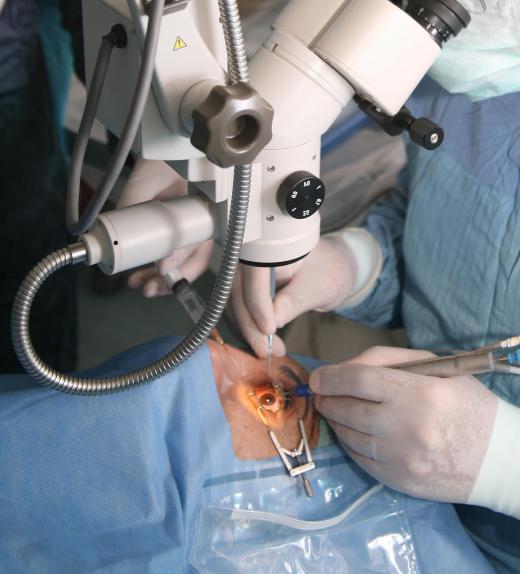Vitrectomy surgery is a vision restoring operation to remove and replace the vitreous if it has become damaged by trauma, infection, or disease that would cause less light to enter the retina and impair vision. The vitreous is the clear, gelatinous material in the eye the main function of which is to hold the eye in place. The procedure may also be recommended to correct retinal detachment, repair tears to the retina itself, or to correct other non-inflammatory retinal damage known as retinopathy. Vitrectomy surgery can also be performed to correct blurred vision of the macula, the center of the light sensitive tissue of the retina; to correct breaks in the tissue, called macular holes; or to repair scar tissue, called macular pucker.
The operation begins with small incisions in the eye, through which surgeons insert microscopic surgical tools, including an internal light source, scalpels and a suction device that will cut the vitreous and remove it. The vitreous is replaced with either a saline-based solution, an intraocular gas compound, or silicone oil, which mimic the natural vitreous tissue to stabilize and maintain proper pressure in the eye. Tiny absorbable sutures are then used to close the incision points and antibiotic injections or drops may be administered to prevent infection.

Vitrectomy surgery is usually performed on an outpatient basis, although in some cases it can require a brief hospital stay of 24 hours or less. Patients require either local or general anesthesia for the two- to four-hour operation, depending on the severity of the issue. Other surgical procedures, such as laser eye therapy or retinal detachment operations, may be performed along with a vitrectomy. The post-operative recuperation period is generally between one to four weeks.

As with any operation, there are some risks associated with vitrectomy surgery, which include swelling, infection, bleeding into the vitreous, or retinal detachment. Some patients may develop cataracts or glaucoma, and may require additional surgery. Most patients, however, experience only mild discomfort due to pain, blurred vision, or eye discharge during the post-operative period.

Depending on the nature of the eye problem, the vast majority of patients who undergo vitrectomy surgery benefit from increased vision, less pain or sensitivity, and reduced pressure on the eye itself. It has become a standard procedure in the treatment of a number of ocular diseases, for injuries sustained to the retina, and for macular degeneration. Regular eye examinations by an ophthalmologist can often diagnose these issues in their early stages to allow vitrectomy surgery an optimum success rate with the lowest possible associated risks.
